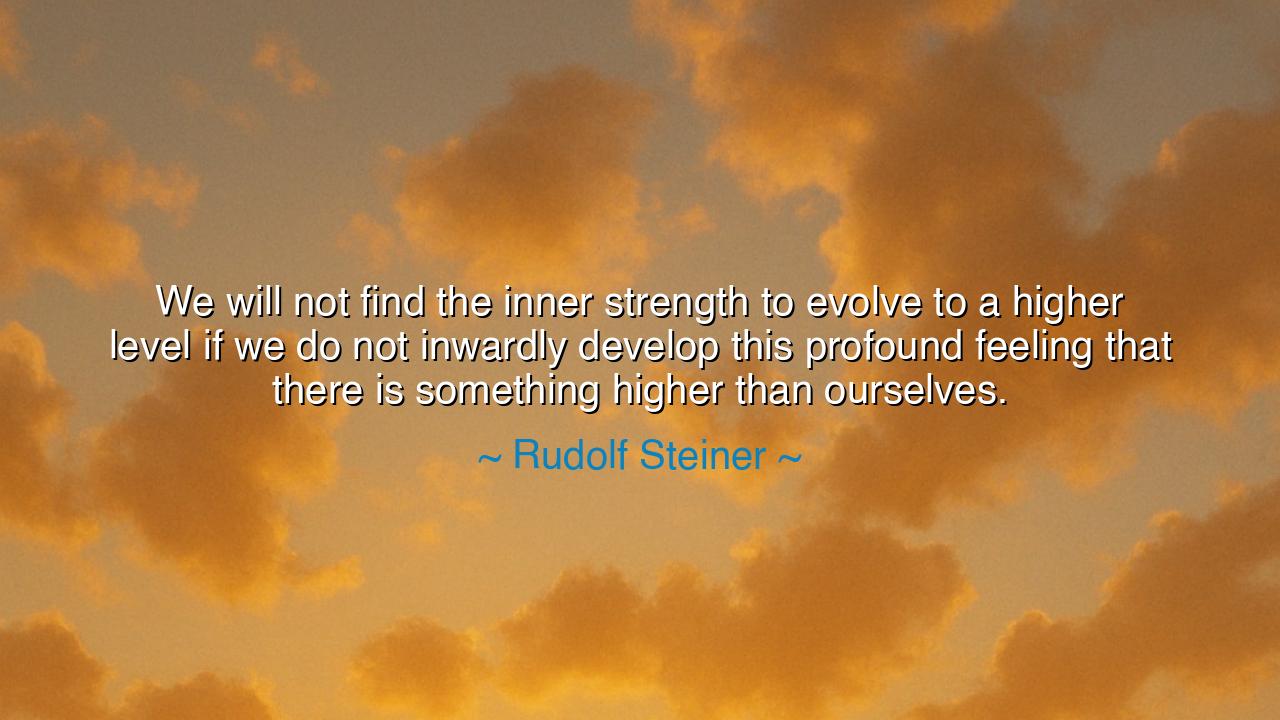
We will not find the inner strength to evolve to a higher level
We will not find the inner strength to evolve to a higher level if we do not inwardly develop this profound feeling that there is something higher than ourselves.






The mystic and philosopher Rudolf Steiner once declared: “We will not find the inner strength to evolve to a higher level if we do not inwardly develop this profound feeling that there is something higher than ourselves.” These words are not idle musings but the distilled essence of a truth known to sages and seers since the dawn of time. For humanity’s greatest danger is not in weakness of the body, nor even in poverty of the mind, but in blindness of the soul — in the arrogance that sees nothing greater than the self.
To speak of something higher than ourselves is to speak of the eternal. It is to acknowledge that beyond the walls of our own desires, beyond the narrow corridors of ego, there exists a vastness — the Divine, the cosmos, truth itself, whatever name one dares give it. Without this upward gaze, man becomes small, trapped in the prison of his appetites. But when he lifts his eyes to something greater, he is ennobled, transformed, and compelled to grow into more than he thought possible.
The inner strength to evolve does not come from comfort, nor from the fleeting victories of pride. It comes from humility before the great mystery of existence. Just as the tree roots itself deeply into the earth so that it may grow toward the heavens, so must the human spirit root itself in reverence, in the acknowledgment that it serves not only itself but a higher order. In this reverence, strength is born — not the strength to dominate, but the strength to endure, to transcend, to rise.
History itself gives us witness. Consider Joan of Arc, a peasant girl who believed she was called by God to save France. By worldly measures, she was powerless: young, untrained, without noble birth. Yet her conviction that there was something higher than herself gave her strength that even kings lacked. She led armies, inspired nations, and carved her name into eternity. Had she relied only on her own fragile self, she would have faltered. But because she drew upon the higher, she became more than mortal — she became legendary.
Steiner’s words remind us that evolution — not of bodies alone, but of souls — requires this same orientation. Without it, we decay into selfishness, into endless consumption, into hollow power that crumbles. With it, we become capable of compassion, of vision, of deeds that outlast our own lives. The higher is the sun to our seed; without it, we do not grow.
The lesson, then, is this: cultivate within yourself the profound feeling that you are part of something vast, something eternal. Call it God, truth, beauty, justice, or simply the mystery of life — but bow before it, and let it shape you. In your prayers, in your meditations, in your silent moments of awe, remember that you are not the center, but a thread in a grander tapestry. This remembrance will give you courage when you are weak, clarity when you are lost, and nobility when you are tempted to fall.
Practical wisdom follows: spend time each day in stillness, gazing at the sky, walking among trees, or reading words that lift your spirit. Ask yourself not only what you desire, but what the higher within you demands. Serve not only yourself, but others, for in serving, you touch the greater whole. And when hardship comes, do not despair, but say: “This too is part of my ascent toward the higher.”
So remember, O listener: the path to evolution is not found in pride, but in reverence. Inner strength comes not from clinging to the self, but from opening the heart to the higher. Let Rudolf Steiner’s words be your guide: there is indeed something greater than you — and it is in knowing this, in feeling this, that you will rise to your truest and highest self.






AAdministratorAdministrator
Welcome, honored guests. Please leave a comment, we will respond soon